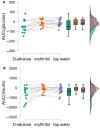Metabolic Effects and Safety Aspects of Acute D-allulose and Erythritol Administration in Healthy Subjects
- PMID: 36678329
- PMCID: PMC9863415
- DOI: 10.3390/nu15020458
Metabolic Effects and Safety Aspects of Acute D-allulose and Erythritol Administration in Healthy Subjects
Abstract
The rapid increase in sugar consumption is associated with various negative metabolic and inflammatory effects; therefore, alternative sweeteners become of interest. The aim of this study was to investigate the metabolic effects and safety aspects of acute D-allulose and erythritol on glucose, insulin, ghrelin, blood lipids, uric acid, and high-sensitive C-reactive protein (hsCRP). In three study visits, 18 healthy subjects received an intragastric administration of 25 g D-allulose or 50 g erythritol, or 300 mL tap water (placebo) in a randomized, double-blind and crossover order. To measure the aforementioned parameters, blood samples were drawn at fixed time intervals. Glucose and insulin concentrations were lower after D-allulose compared to tap water (p = 0.001, dz = 0.91 and p = 0.005, dz = 0.58, respectively); however, Bayesian models show no difference for insulin in response to D-allulose compared to tap water, and there was no effect after erythritol. An exploratory analysis showed that ghrelin concentrations were reduced after erythritol compared to tap water (p = 0.026, dz = 0.59), with no effect after D-allulose; in addition, both sweeteners had no effect on blood lipids, uric acid and hsCRP. This combination of properties identifies both sweeteners as excellent candidates for effective and safe sugar alternatives.
Keywords: D-allulose; blood lipids; erythritol; ghrelin; glycemic control; healthy subjects; hsCRP; sweeteners; uric acid.
Conflict of interest statement
The authors declare no conflict of interest. The funders had no role in the design of the study; in the collection, analyses, or interpretation of data; in the writing of the manuscript, or in the decision to publish the results.
Figures




References
-
- Teff K.L., Elliott S.S., Tschöp M., Kieffer T.J., Rader D., Heiman M., Townsend R.R., Keim N.L., D’Alessio D., Havel P.J., et al. Dietary Fructose Reduces Circulating Insulin and Leptin, Attenuates Postprandial Suppression of Ghrelin, and Increases Triglycerides in Women. J. Clin. Endocrinol. Metab. 2004;89:2963–2972. doi: 10.1210/jc.2003-031855. - DOI - PubMed
-
- Johnson R.J., Segal M.S., Sautin Y., Nakagawa T., Feig D.I., Kang D.-H., Gersch M.S., Benner S., Sánchez-Lozada L.G. Potential role of sugar (fructose) in the epidemic of hypertension, obesity and the metabolic syndrome, diabetes, kidney disease, and cardiovascular disease. Am. J. Clin. Nutr. 2007;86:899–906. - PubMed
Publication types
MeSH terms
Substances
Grants and funding
LinkOut - more resources
Full Text Sources
Medical
Research Materials
Miscellaneous

